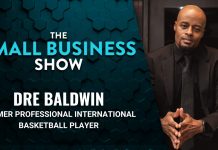Welcome to the first episode of Launched & Legal with Dayna Thomas, Esq., entrepreneurship attorney and law firm coach. Launched & Legal is an Atlanta Small Business Network original series dedicated to bringing entrepreneurs and business owners the best practices and tips for strategizing, legalizing, and monetizing their ventures. So tune in every week for expert analysis, engaging interviews, and the answers to all of your questions. Today, Dayna takes a deep dive into trademarks. You might be asking yourself—what should I trademark? How long does it last? Find out right now on Launched & Legal.
Transcription:
Dayna Thomas:
First, before we get into it, I just want to say how excited I am to be a part of the myASBN.com team. It’s been quite an amazing journey for me in entrepreneurship, from starting my law firm right out of law school, of course, having believed in myself and planning the steps to now being your host for Launched and Legal. So one message that I will have today and for every show is to believe in yourself, do it the right way, invest in yourself, and of course, don’t stop because the only way that you can fail is if you quit.
Dayna Thomas:
So with that said, thank you for joining in on today’s show. We’re going to be talking about one of my favorite, favorite topics, which is trademarks. So you may have heard about trademarks, you may know what it is, but there’s so much information floating around there that may or may not be true about trademarks. Does your business have to be a certain size? Do you have to wait until you’re actually making money? I’m going to talk about today some of the things that you really need to know about trademarks, but we’re going to do it in a fun way. I am going to do a true or false addition as it relates to trademarks. So let’s jump right into it.
Dayna Thomas:
The first one I have for you, true or false, trademarks can last forever? That is true. Trademarks can totally last forever, which makes it an amazing investment. Now, although you do have to file maintenance documents as it relates to your trademarks to make sure that it does last forever, and you always have to make sure that you are using your mark in commerce, that means to promote or sell a product. As long as you’re doing that and as long as you are filing your maintenance documents when needed, which is between the fifth and the sixth year of your trademark registration, the ninth and 10th year after your trademark registration, and then every 10 years after that. As long as you file those and you’re still using your mark, your trademark can last forever. I know that is great news, and that’s what makes it a wonderful investment for your business and your brand. Let’s move on to the next one.
Dayna Thomas:
Let’s see, you can trademark a logo, even if you don’t own the copyright for it. Now, I know a lot of folks get confused between trademark and copyright, but this is actually true. Now, although trademarks and copyright both protect intellectual property, they’re actually very different rights. So you may not own the copyright to your logo, especially if you didn’t create it and there isn’t a contract that’s transferred the ownership of the copyright to you or your business. However, you may be able to trademark it so long as the copyright owner gives you a license to use it in commerce or to use it commercially meaning essentially to sell your product or service. So you don’t have to own the copyright in your logo in order to trademark it because it gives you two different rights.
Dayna Thomas:
All right. Next, we are going to go to once you have a trademark, no one else can use your brand name in commerce. Now, that is false. Just getting a trademark does not mean that no one can use your brand name or your logo at all. Your trademark rights will extend to products and services or uses that would be confusingly similar to yours. So for example, we know about Delta Airlines, and then we also know about Delta faucets, right? So although both use the same name, their services and products are very different. So if we came across Delta Airlines or we go to the airport, we’re not going to expect to buy a faucet and vice versa. So just because you own a trademark for a specific product or service, while it does cover related products or services, it does not mean that you have the exclusive right to use that mark for any and every product or service. Okay.
Dayna Thomas:
All right, moving right along. Let’s go to the next one. You can file a trademark application for a mark you haven’t started using. Now, that is true, which is super exciting. That means that if you haven’t started using your brand name yet, maybe it’s just in the development phase, but you are so firm on this is the mark, the name, the logo that you want to use, but you haven’t started selling or promoting anything yet, go ahead and submit your trademark application. In my opinion, this is the best time to submit your trademark application is before you go crazy with marketing and investing in inventory and associating that brand with you, because you want to make sure that it’s actually available to trademark before you spend the time and money to produce it or promote it. So yes, you can get a trademark before you start using a brand name, a logo or anything else that you want to trademark, but before you get your trademark registration, you have to start using it.
Dayna Thomas:
Moving right along. Let’s go to the next one. Tell me, true or false. You can trademark your brand name and logo in the same application. Now, I get this question all the time. Sometimes for folks that want to, let’s say, make the most of their budget, right? So unfortunately, you have to trademark your name and logo in a separate application, so that is false. You cannot trademark your name and logo in the same application. The trademark examiner and the US PTL will require for it to be in separate applications because essentially they’re separate marks. It is true that you can have a name that’s that is accepted by the US PTO, United States Patent and Trademark Office, but your logo isn’t. They get assessed separately because they have different elements that may be confusingly similar to something else that’s already trademarked. So that one, you have to make sure that they are in separate applications. Okay.
Dayna Thomas:
Next, by securing a domain name, you have trademark rights. Now, I know a lot of folks have tried this, but that is actually false. Securing a domain name gives you no trademark rights at all. It gives you something valuable, which is that awesome URL that you’ve always wanted, but it does not give you any right to exclude anyone else from using that brand name. Okay.
Dayna Thomas:
All right, next. By forming your LLC, you have trademark rights in the LLC name. False. Just because you form an LLC and your LLC is accepted, you now have your business in that name, that does not mean that you have any trademark rights at all. Actually, a lot of companies file names under their LLC, but they don’t use that brand name at all to promote a product or a service. So your LLC name, or just simply filing your LLC with a certain name, it gives you absolutely no rights to trademark. Trademark is a completely separate process. Okay.
Dayna Thomas:
Next, it’s only trademark infringement if someone else uses your exact same brand name. Now, that my friends is false. It does not have to be the exact same brand or the exact same logo to be trademark infringement. In fact, anything that may be confusingly similar could be trademark infringement. Now, unfortunately, we don’t have an exact definition of what confusingly similar may be. There’s a bunch of case laws that lawyers can use and different ways that trademark examiners have interpreted applications before that will give us some direction on what is confusingly similar. However, there’s some elements to your name, some elements to your logo, as well as whether the product and the service are related, that can help us to make that determination, but it being the exact same as not the threshold.
Dayna Thomas:
All right. You cannot protect a t-shirt design with a trademark. Now tell me, is that true or false? That is true. You cannot protect your t-shirt design with a trademark. I’ve had many clients come to me and they have an awesome design for their t-shirt and they want to trademark it, but unfortunately I have to share the news that t-shirt designs are not trademarkable. So pretty much what I’m talking about is when you have a design on your shirt and you want to submit that to the trademark office to say, “Hey, I don’t want anyone else to use this design to sell t-shirts.” The trademark office is going to reject that because trademarks are not for designs. Trademarks are for an indication of source. Meaning the trademark is for the company that sells that shirt, not the design itself. So that means that you would have to show that mark, either on the tag of a shirt, a tag you can pop, or the back of a tag, which often indicates who sells the shirt, but we cannot trademark just the design of the shirt itself.
Dayna Thomas:
All right, moving right along. Let’s go to the next one. The US PTO, United States Patent and Trademark Office, gives you a refund of your filing fee if your application gets rejected. Now, I know we wish this was true, but I’m going to go ahead and say that it’s false. There are no refunds for your trademark application filing fees. That’s why it’s so important to make sure that it gets done correctly and gets done correctly the first time because I know as an entrepreneur, every dollar counts. So make sure that you’re doing it right the first time. Get legal help for your trademark, for sure.
Dayna Thomas:
All right. Our last one in our show today is the best time to trademark is now. Is that a true or false? Well, if you’ve been listening in today’s show, that is certainly true. The best time is now, whether you just started your business, you just decided on your name that you want to use, or you’ve been in business for 10 years, but haven’t trademarked yet. The best time is right now. Do not delay because it creates another issue for you if someone trademarks your name or something confusingly similar to it before you, and we don’t want that to happen. So make sure that trademarking is at the top of your list. It’s a priority for you as you’re starting your business, launching your business and taking it to the next level.
Dayna Thomas:
Well, I hope today’s show helped to and inspire you as you pursue your business goals. Be sure to share today’s show with someone who can benefit and visit myasbn.com and subscribe. If you have any questions at all or comments about today’s show, I’d love to hear from you. Send me a message or a comment on Instagram at Dayna Thomas Law. Remember to tune in next week and every week to make sure your business is Launched and Legal.
The Atlanta Small Business Network, from start-up to success, we are your go-to resource for small business news, expert advice, information, and event coverage.
While you’re here, don’t forget to subscribe to our email newsletter for all the latest business news know-how from Atlanta Small Business Network.








